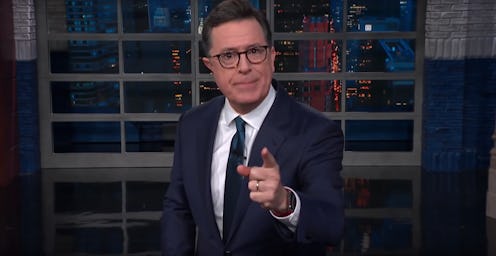News
Stephen Colbert Has An Idea For What “Spygate” Should Really Be Called
President Trump has co-opted the term "Spygate" to describe his unsubstantiated claim that the FBI implanted an agent with his campaign, a move that surprised many fans and followers of football. Among them was late night host Stephen Colbert, whose "Spygate" joke knocked Trump for using the term, as it's already been adopted to refer to two previous scandals.
Colbert showed a clip of Trump talking to CBS News, saying, "We're calling it Spygate. You're calling it Spygate." Colbert's camera then cut to him, and the host said in all seriousness, "No, we're not."
Colbert immediately went on to point out that "a) a criminal investigation is not 'spying.' It should be 'Investigate-gate.'" Then Colbert noted the rather well-known fact that "Spygate has already been used — twice." The first time was back in 2003, when the term Spygate was used to describe the unmasking of CIA agent Valerie Plame. The second, and likely more familiar, usage of Spygate came in 2007, after the New England Patriots were caught secretly videotaping the coaching signals of their Super Bowl rival, the New York Jets.
Colbert wrapped up the segment by joking, "Well, as long as we’re just stealing other scandals’ names, from now on, Watergate is the fact that Trump can’t drink one-handed.”
But Colbert wasn't done with Trump yet. The late night host went on to deconstruct several of Trump's tweets from the president's Wednesday morning tweetstorm, all of them involving the so-called "Spygate" scandal of 2018.
Colbert quoted the full text of one tweet, which read in part that the FBI's investigation into "Phony Collusion with Russia" has led the agency to "getting caught in a major SPY scandal the likes of which this country may never have seen before! What goes around, comes around!"
But Colbert very much begged to differ. "Donald Trump, you for one should not be talking about 'what goes around comes around.' You are living proof that karma does not exist," Colbert said.
Shortly thereafter, Colbert attempted to follow the labyrinthine logic of a pair of tweets delving into Trump's theory on the "SPY" he asserts the previous administration assigned to his presidential campaign. "Follow Trump down the rabbit hole here, OK?" Colbert said. He sums up Trump's argument thusly: The FBI sent a spy to his campaign, paid that person "massive" sums of money, all with the intention of ruining Trump's presidential run by exposing collusion with Russia. But then the spy refrained from telling the press anything, Hillary Clinton went on to lose the election, all so that "when Trump revealed this plot he would seem like a desperate criminal spinning conspiracy theories."
Colbert closed his segment on Trump by showing a clip of the president talking about the importance of "transparency" in understanding how the original investigation into his campaign was launched. Commenting on the president's calls for total openness on the part of the FBI, and mimicking Trump's voice, Colbert riffed, "Yes, we want total transparency. Like releasing tax returns, except not that."
And Colbert clearly wasn't buying Trump's insistence that transparency was not a partisan issue. "This is above party. But I'm only letting Republicans in," said the host, still in Trump-impersonation mode.
"That may not be transparent, but those guys are so white, they're at least translucent," Colbert-as-Trump said, referring to Reps. Trey Gowdy and Devin Nunes, the two Republican House members who are set to discuss and potentially view the original FBI documents today.
When it comes to "Spygate," Colbert clearly is not buying Trump's version of the FBI's investigative actions. But he does seem perfectly content to use it as comedic fodder.
